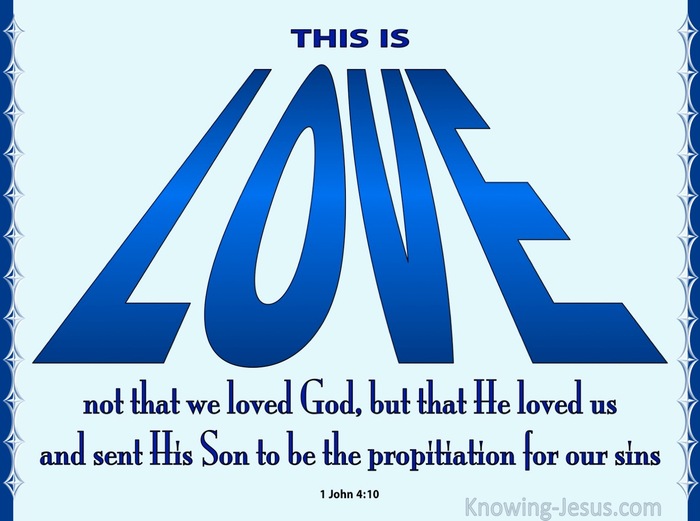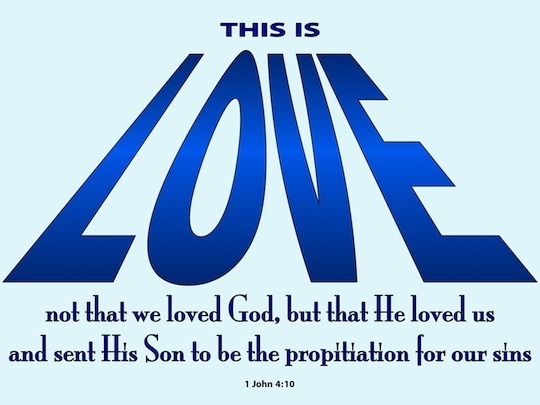Parallel Verses
King James Version
Herein is love, not that we loved God, but that he loved us, and sent his Son to be the propitiation for our sins.
New American Standard Bible
In this is love,
Holman Bible
Love consists in this: not that we loved God, but that He loved us
International Standard Version
This is love: not that we have loved God, but that he loved us and sent his Son to be the atoning sacrifice for our sins.
A Conservative Version
In this is love, not that we loved God, but that he loved us, and sent his Son, an atonement for our sins.
American Standard Version
Herein is love, not that we loved God, but that he loved us, and sent his Son to be the propitiation for our sins.
Amplified
In this is love, not that we loved God, but that He loved us and sent His Son to be the propitiation [that is, the atoning sacrifice, and the satisfying offering] for our sins [fulfilling God’s requirement for justice against sin and placating His wrath].
An Understandable Version
Here is [the essence of] love: [It is] not that we loved God [first], but that He loved us [See Rom. 5:6-8] and sent His Son to be a "covering over" [i.e., atonement, 2:2] for our sins.
Anderson New Testament
In this is love; not that we loved God, but that he loved us, and sent his Son to be the expiation for our sins.
Bible in Basic English
And this is love, not that we had love for God, but that he had love for us, and sent his Son to be an offering for our sins.
Common New Testament
In this is love, not that we loved God but that he loved us and sent his Son to be the atoning sacrifice for our sins.
Daniel Mace New Testament
and what heightens his love, was this, that it was not we who first loved God, but it was he that first loved us, and sent his son to expiate our sins.
Darby Translation
Herein is love, not that we loved God, but that he loved us, and sent his Son a propitiation for our sins.
Emphatic Diaglott Bible
In this is love, not that we loved God, but that he loved us, and sent forth his Son to be a propitiation for our sins.
Godbey New Testament
In him is divine love, not because we loved God with divine love, but because he loved us with divine love, and sent his Son an expiation for our sins.
Goodspeed New Testament
The love consists not in our having loved God, but in his loving us and sending his Son as an atoning sacrifice for our sins.
John Wesley New Testament
Herein is love; not that we loved God, but that he loved us, and sent his Son, a propitiation for our sins.
Julia Smith Translation
In this is love, not that we loved God, but that he loved us, and sent his Son a propitiation for our sins.
King James 2000
In this is love, not that we loved God, but that he loved us, and sent his Son to be the propitiation for our sins.
Lexham Expanded Bible
In this is love: not that we have loved God, but that he loved us and sent his Son [to be the] propitiation for our sins.
Modern King James verseion
In this is love, not that we loved God, but that He loved us and sent His Son to be the propitiation concerning our sins.
Modern Spelling Tyndale-Coverdale
Herein is love, not that we loved God, but that he loved us, and sent his son to make a satisfaction for our sins.
Moffatt New Testament
Love lies in this, not in our love for him but in his love for us ??in the sending of his Son to be the propitiation for our sins.
Montgomery New Testament
In this is love, not that we loved God, but that he loved us, and sent his Son to be a propitiation for our sins.
NET Bible
In this is love: not that we have loved God, but that he loved us and sent his Son to be the atoning sacrifice for our sins.
New Heart English Bible
In this is love, not that we have loved God, but that he loved us, and sent his Son as the atoning sacrifice for our sins.
Noyes New Testament
Herein is love, not that we loved God, but that he loved us, and sent his Son to be a propitiation for our sins.
Sawyer New Testament
In this is love; not that we loved God, but that he loved us, and sent his Son a propitiation for our sins.
The Emphasized Bible
Herein, is love: not that, we, have loved God, but that, he, loved us, and sent forth his Son, as a propitiation concerning our sins.
Thomas Haweis New Testament
Herein is love, not that we have loved God, but that he hath loved us, and sent his Son to be the propitiatory sacrifice for our sins.
Twentieth Century New Testament
His love is seen in this--not in our having loved God, but in his loving us and sending his Son to be an atoning sacrifice for our sins.
Webster
In this is love, not that we loved God, but that he loved us, and sent his Son to be the propitiation for our sins.
Weymouth New Testament
This is love indeed--we did not love God, but He loved us and sent His Son to be an atoning sacrifice for our sins.
Williams New Testament
In this way is seen the true love, not that we loved God but that He loved us and sent His Son to be the atoning sacrifice for our sins.
World English Bible
In this is love, not that we loved God, but that he loved us, and sent his Son as the atoning sacrifice for our sins.
Worrell New Testament
Herein is love, not that we loved God, but that He loved us, and sent His Son, to be a propitiation for our sins.
Worsley New Testament
Herein is love; not that we loved God, but that He loved us, and sent his Son to be a propitiation for our sins.
Youngs Literal Translation
in this is the love, not that we loved God, but that He did love us, and did send His Son a propitiation for our sins.
Themes
The atonement » Exhibits the » Love of God
Condescension of God » Scriptures relating to
John, beloved disciple » Facts concerning » Learned the lesson of love in the school of Christ
God, Love Of » Exhibited in » Christ's dying for us while sinners
Propitiation » Expiation, sin-offering
Interlinear
Hoti
ὅτι
Hoti
Usage: 764
Peri
References
American
Easton
Fausets
Hastings
Morish
Smith
Watsons
Word Count of 38 Translations in 1 John 4:10
Prayers for 1 John 4:10
Verse Info
Context Readings
God's Love Revealed
9 In this was manifested the love of God toward us, because that God sent his only begotten Son into the world, that we might live through him. 10 Herein is love, not that we loved God, but that he loved us, and sent his Son to be the propitiation for our sins. 11 Beloved, if God so loved us, we ought also to love one another.
Names
Cross References
1 John 2:2
And he is the propitiation for our sins: and not for ours only, but also for the sins of the whole world.
1 Peter 3:18
For Christ also hath once suffered for sins, the just for the unjust, that he might bring us to God, being put to death in the flesh, but quickened by the Spirit:
1 John 3:1
Behold, what manner of love the Father hath bestowed upon us, that we should be called the sons of God: therefore the world knoweth us not, because it knew him not.
1 John 4:19
We love him, because he first loved us.
Deuteronomy 7:7-8
The LORD did not set his love upon you, nor choose you, because ye were more in number than any people; for ye were the fewest of all people:
Daniel 9:24
Seventy weeks are determined upon thy people and upon thy holy city, to finish the transgression, and to make an end of sins, and to make reconciliation for iniquity, and to bring in everlasting righteousness, and to seal up the vision and prophecy, and to anoint the most Holy.
John 3:16
For God so loved the world, that he gave his only begotten Son, that whosoever believeth in him should not perish, but have everlasting life.
John 15:16
Ye have not chosen me, but I have chosen you, and ordained you, that ye should go and bring forth fruit, and that your fruit should remain: that whatsoever ye shall ask of the Father in my name, he may give it you.
Romans 3:25-26
Whom God hath set forth to be a propitiation through faith in his blood, to declare his righteousness for the remission of sins that are past, through the forbearance of God;
Romans 5:8-10
But God commendeth his love toward us, in that, while we were yet sinners, Christ died for us.
Romans 8:29-30
For whom he did foreknow, he also did predestinate to be conformed to the image of his Son, that he might be the firstborn among many brethren.
2 Corinthians 5:19-21
To wit, that God was in Christ, reconciling the world unto himself, not imputing their trespasses unto them; and hath committed unto us the word of reconciliation.
Ephesians 2:4-5
But God, who is rich in mercy, for his great love wherewith he loved us,
Titus 3:3-5
For we ourselves also were sometimes foolish, disobedient, deceived, serving divers lusts and pleasures, living in malice and envy, hateful, and hating one another.
1 Peter 2:24
Who his own self bare our sins in his own body on the tree, that we, being dead to sins, should live unto righteousness: by whose stripes ye were healed.
1 John 4:8-9
He that loveth not knoweth not God; for God is love.




